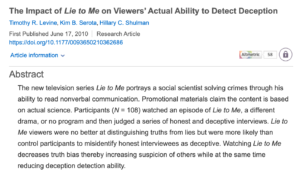Hey everybody, it’s David Matsumoto from Humintell. I wanted to thank everybody for the tremendous response that we have received about our last 2 videos.
One was on the introduction to what is body language and the other one was about whether you can tell the difference between fake and genuine emotions.
One of the things that I had talk about in the body language video was the difference between validated and non-validated indicators. Some of you had asked for us to go and discuss that a little more, so I thought I’d do that today.
What are Validated Indicators?
Validated indicators are those indicators that have been tested in research and found to reliably differentiate truth tellers from liars across studies, investigators and laboratories. And, they have also been vetted in the field.
What are Non-Validated Indicators?
Non-validated indicators are those indicators or behaviors that have been tested in laboratory studies but have not been found to reliably differentiate truth tellers from liars.
We also think about what are called unvalidated indicators. These are behaviors that have not even been tested yet. In our research and in our training work, we always focus on validated indicators. Again, validated in the science and vetted in the field. We believe these are the most important ones interviewers and investigators and anyone who’s reading people should be focused on.
Fake vs Genuine Emotions
So now let’s move our attention to the other video, the fake vs genuine emotions. I saw everybody’s great responses and for the most part, everybody was correct in differentiating which video or which person was telling the truth and which one was lying.
But it’s really interesting to take a look at what behaviors people’s were focusing on to make that kind of determination. We actually tallied the various behaviors that people had mentioned and one of the most frequent behaviors that people had mentioned were the “shifty eyes” or what we call gaze aversion– where a person does not look one straight in the eye when answering the question.
Gaze Aversion: Validated or Non-Validated Indicator?
Actually, gaze aversion is a behavior that has been tested many times in laboratory studies to determine whether it reliably differentiates truth tellers and liars. As of a few years ago, of the 25 studies that I knew at that time that tested that hypothesis, 24 of those studies did not find evidence to support that hypothesis. And we in our research have never found that also.
So to tell you the truth, gaze aversion as an indicator of lying is more of a myth that a reality. In fact, there have been studies by other people that have shown that that myth is believed by many people around the world. So it kind of makes sense that people think that that’s true but in reality that’s not a validated indicator nor has it been vetted in the field.
If you take a look at those two videos, one has more of the shifty eyes, in addition to the other indicators, while the other one did not, but in reality there are many people who also tell the truth and not necessarily look other people in the eye or have shifty eyes when they’re doing so.
So when you look across people at that one particular indicator or behavior, you find that really that indicator does not really differentiate truth tellers from liars. Now, it does indicate a certain type of mental state and we leave that kind of information for our training, but it’s not indicative of truth telling and lying. It’s not a reliable or validated indicator of truth telling vs lying.
What makes Humintell unique
One of the things that we do here at Humintell that we’re very proud of is that we focus solely on the validated indicators. Again, validated in science, vetted in the field because we believe these are the most important ones to train others in. That’s why we do the research and we know the research not only on our findings, but we also know the findings of all the other researchers in the field. We have a really good idea of what’s been validated in science then when we train people, we get the feedback of what’s been vetted in the field.
What do you think about these examples?
We’re going to introduce you to some other videos of people who are actually telling the truth but also not looking one in the eye or shifting away in their gaze. Just take a look how that happens there as well. Remember most of these people you’re about to see are telling the truth.
Example 1
Example 2
Now we have a question for you after you take a look at the videos above. Chime in and let us know what other behaviors do you think have been validated or not in science and in the field. Maybe we can talk a little more about validated vs non-validated or unvalidated indicators with regard to truth telling and lying



 What is the Societal Impact of the Show?
What is the Societal Impact of the Show? Where can I watch Lie to Me?
Where can I watch Lie to Me?